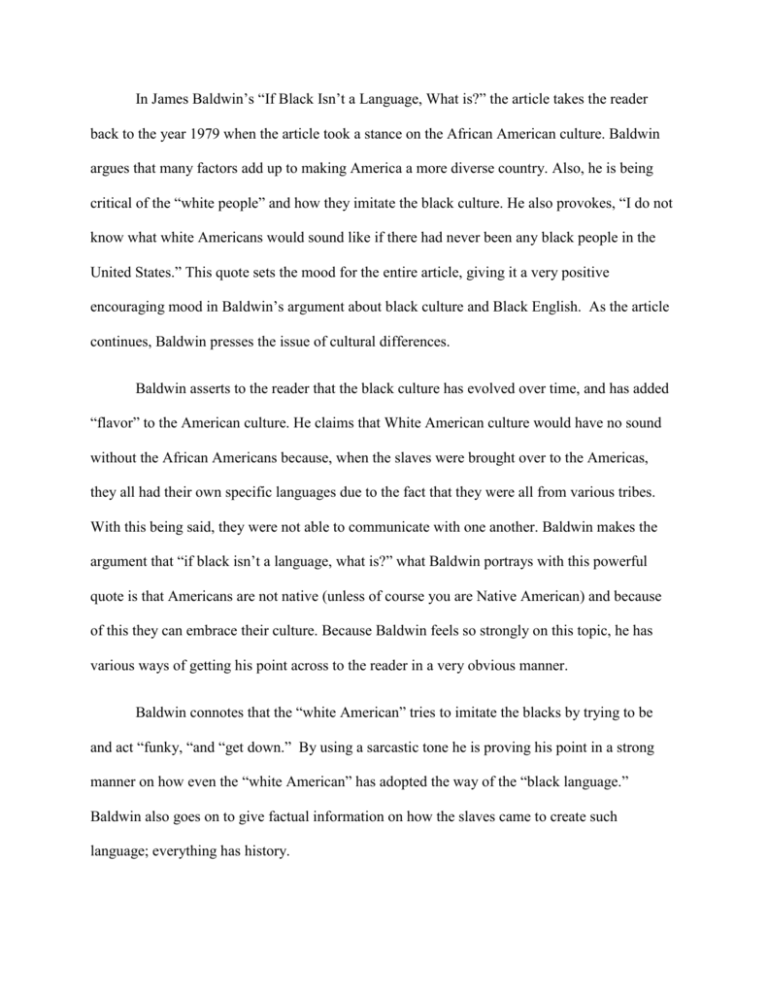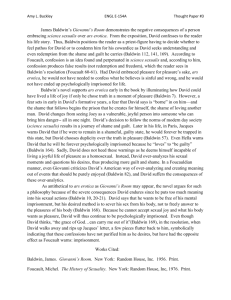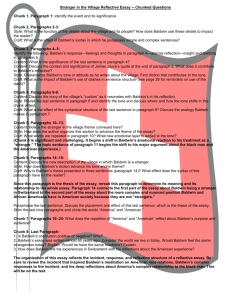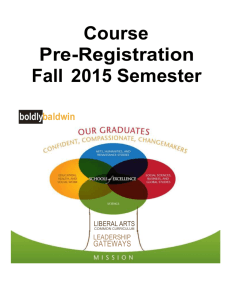final textual analysis
advertisement

In James Baldwin’s “If Black Isn’t a Language, What is?” the article takes the reader back to the year 1979 when the article took a stance on the African American culture. Baldwin argues that many factors add up to making America a more diverse country. Also, he is being critical of the “white people” and how they imitate the black culture. He also provokes, “I do not know what white Americans would sound like if there had never been any black people in the United States.” This quote sets the mood for the entire article, giving it a very positive encouraging mood in Baldwin’s argument about black culture and Black English. As the article continues, Baldwin presses the issue of cultural differences. Baldwin asserts to the reader that the black culture has evolved over time, and has added “flavor” to the American culture. He claims that White American culture would have no sound without the African Americans because, when the slaves were brought over to the Americas, they all had their own specific languages due to the fact that they were all from various tribes. With this being said, they were not able to communicate with one another. Baldwin makes the argument that “if black isn’t a language, what is?” what Baldwin portrays with this powerful quote is that Americans are not native (unless of course you are Native American) and because of this they can embrace their culture. Because Baldwin feels so strongly on this topic, he has various ways of getting his point across to the reader in a very obvious manner. Baldwin connotes that the “white American” tries to imitate the blacks by trying to be and act “funky, “and “get down.” By using a sarcastic tone he is proving his point in a strong manner on how even the “white American” has adopted the way of the “black language.” Baldwin also goes on to give factual information on how the slaves came to create such language; everything has history. When Baldwin describes the history of the African tribes and how they came to create a dialogue, the context of this information creates a strong part of his argument. What Baldwin is implying is that America is made up of many cultures and the black culture is merely a reflection of the rest of the diversity represented in America. A strong quote that Baldwin uses to his advantage to justify his argument is, “A language comes into existence by means of brutal necessity, and the rules of the language are dictated by what the language must convey.”(12.) By using such a powerful quote, Baldwin supports his main point and in a subtle tone changes from being informative to being sly and subtle; he uses this quote to prove his overall point that the African American culture has been a positive attribute to the American society. Baldwin writes this article in order to move people in an emotional manner. He wants the readers to view the African American culture as part of a contribution to diversity in America. He purposely gives the examples of music, and the slave movement to reiterate the importance of their culture and the origins in which they came from. Baldwin also makes a powerful statement in the closing lines. He states that before a white man would not be able to understand the ways and language of an African American and now that the world is evolving they can get a better grasp on their culture. He also goes on to say that now a white man can understand, but might be afraid to accept these ideas that the society is evolving over time. In order to make all the points above, Baldwin connects with historical factors, as well as social modern day factors of that time in the 1970s. Baldwin is also making a very bold statement by writing in the New York Times. As many are aware of, the New York Times is considered to be a “liberal” newspaper. By Baldwin having his article published in such a newspaper, he already is making a very strong statement. His article is very liberal, and speaks of current issues at that time. If someone who was not that liberal were to view this article they might make quick judgment on the social aspect, as well as judge Baldwin in a negative way. Due to the powerful argument that Baldwin has given throughout the entire article, his intended audience appears to be the socially active “white man” (which is who reads the New York Times the most) of this point in the late 1970s, or also the educated opened minded person who is eager to learn numerous perspectives on the world. Furthermore Baldwin had a very subtle way going about his argument and proving his point, though with some help of little sarcasm and enthusiasm, his argument holistically proved a great point of today’s and previous historical cultural differences. Baldwin, J ames. "If Black E nglish isn't a Language, What Is? " New York Times September 26, 2010, No.55,175: 1&12. Print.






